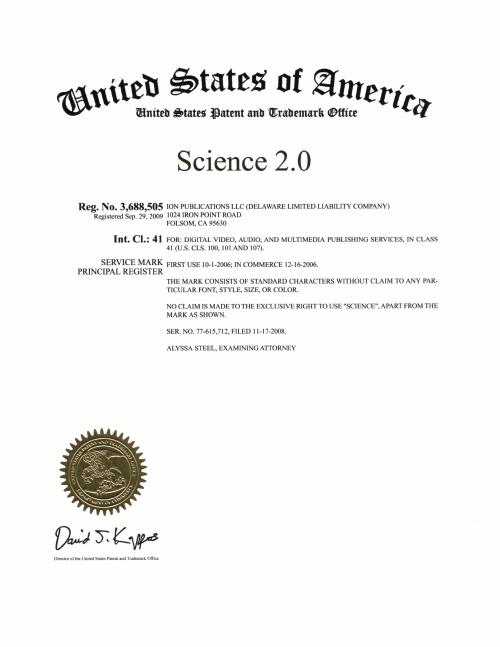But Burke makes a crucial error that strikes right at the heart of the confluence of science and culture; namely that even the NYAS does not not know what Science 2.0 is, other than through a revenue framework.
Here are the 7 people interviewed as Science 2.0 pioneers:
Harold Varmus, co-founder of Public Library of Science
Timo Hannay, Publishing Director, Nature Publishing Group
Stewart Wills, Editorial Director, Web&New Media, Science Magazine
Adam Bly, founder of Seed Magazine (owner of Scienceblogs.com and Researchblogging.org)
James Boyle, founding member of Creative Commons
Anurag Acharya, Founding Engineer, Google Scholar
John Wilbanks, Executive Director, Science Commons and Scienceblogs.com writer
The first three are peer-reviewed journals so very much Science 1.0 - and two of them charge readers.

Hint: this is not Science 2.0 but it is part of the reason I trademarked it.
Seed is a magazine so Science Communication 1.0, though I would consider Scienceblogs.com a Science 2.0 idea since it is bypassing traditional gate keeping and bridging the gaps between science and the public, just like we are.
Creative Commons did not issue forth as part of Science 2.0, it came before and is a way to make publishing a little easier without giving away copyright. So Boyle's inclusion is a little puzzling.
Google Scholar is a search feature owned by a multi-billion dollar juggernaut, so definitely not Science 2.0.
Science Commons is basically creative commons, except for data, and data is the foundation of science - this is the only one where the author gets it right about it being Science 2.0. Though I created the term years earlier, Wilbanks has at least been at this since 2006 (so not a bandwagon newcomer) and a Creative Commons effort for data can be considered 'pioneering'.
If you read Burke's article you got a question and answer with seven people but no clear idea what they all had in common or why Burke considers most of it Science 2.0 at all. Is Science 2.0 simply open access? Errrrr, no, this site is Science 2.0 and it is not open access yet the questions for Varmus relate only to open access and the questions for Bly relate to how his company wants to change the nature of Impact Factors. Wills mentions that Science has been on the Web since 1996 so I am not sure he even knew what article he was in. If open access is not Science 2.0, Twitter is certainly not.
These are 7 Science 2.0 'pioneers' but none of them seem to know what Science 2.0 is. So send me a mail or leave a comment and tell me what you think it is. My next article will be laying it out once and for all, though I expect people will still use Science 2.0 like "jobs saved or created" - basically to mean whatever they feel like.

edit: by request I have added in a copy of the Science 2.0 trademark registration, I guess so it can show up in Google or something.



Comments